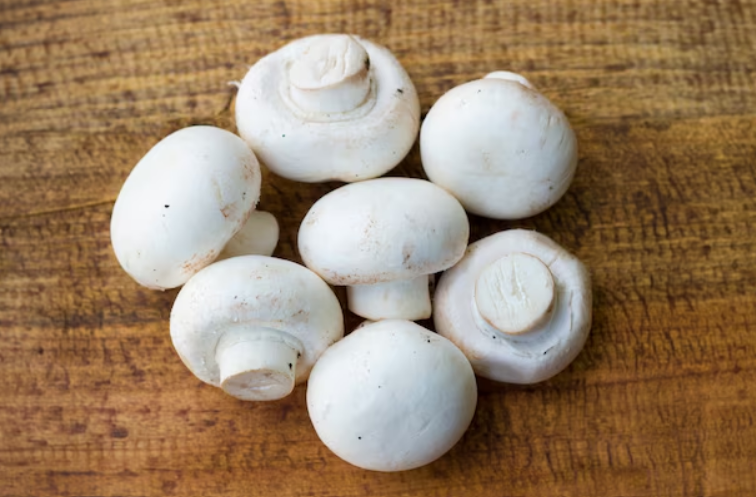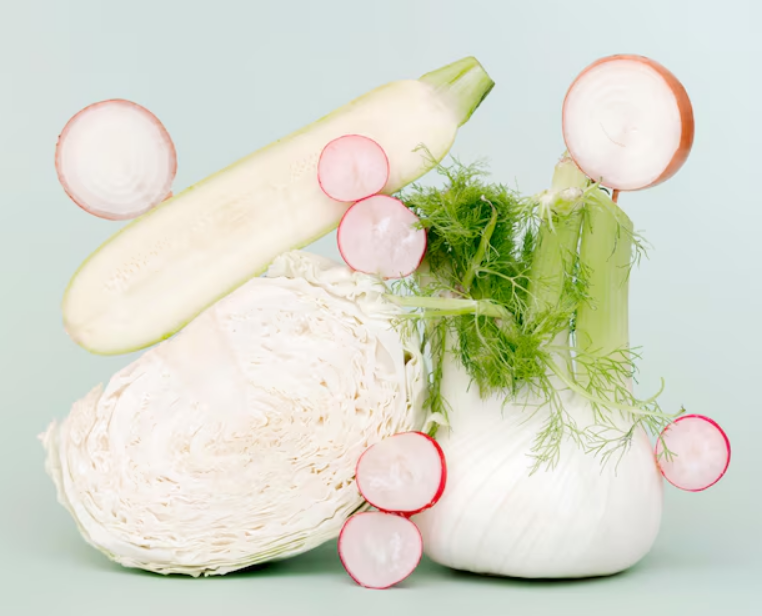White Fruits and Vegetables: An Essential Dietary Component
When people think about eating healthily, they often focus on bright, colorful fruits and vegetables. However, white foods are just as important for a balanced diet due to their amazing health benefits. Nutritious white foods contain numerous nutrients, vitamins, minerals, and antioxidants that are essential for maintaining overall health and wellness. Foods like dairy products and root vegetables support body functions and help you reach your fitness and health goals.
Health Benefits of White Foods
Including nutritious white foods in your diet offers various health advantages, such as improving digestion, supporting weight control, promoting heart health, and boosting the immune system. Foods like cauliflower, garlic, onions, mushrooms, and white beans are nutrient-dense and versatile, making them easy to include in various meals.
These white foods are packed with essential vitamins, minerals, antioxidants, and fiber, helping to maintain a well-balanced and nutrient-rich diet. By embracing the health benefits of white foods, you can improve your overall well-being while enjoying delicious meals.
1. Cruciferous Superfood: Cauliflower
Cauliflower is a powerful vegetable often overlooked for its health benefits. This cruciferous vegetable is rich in key nutrients, including antioxidants, fiber, folate, vitamin C, and vitamin K. Its anti-inflammatory properties make it a great option for reducing the risk of chronic diseases like cancer and heart disease.
Cauliflower is incredibly versatile. You can roast it for a tasty side dish, eat it raw in salads, or mash it as a low-carb substitute for mashed potatoes. Its high fiber content helps maintain a healthy digestive system, while its antioxidants strengthen the immune system and protect cells from oxidative damage.
2. Garlic: A Tasty Immune Enhancer
Garlic is a popular cooking ingredient due to its strong flavor and aroma, but it also has many health benefits. Garlic contains compounds like allicin, which have antibacterial, antiviral, and antifungal properties. These compounds help reduce inflammation and strengthen the immune system. Regular consumption of garlic may improve heart health, lower blood pressure, and reduce cholesterol levels.
Garlic also has anti-cancer properties, particularly against cancers of the digestive system. You can easily incorporate garlic into your meals by adding it to soups, stews, sauces, or roasted vegetables.

3. Onions: A Nutritious and Tasty Mainstay
Onions are another food with numerous health benefits. They are rich in minerals like potassium and manganese, as well as vitamins such as folate, vitamin C, and vitamin B6. Onions are also a great source of antioxidants like quercetin, which has anti-inflammatory and anti-cancer effects. By lowering cholesterol, onions promote heart health and help regulate blood sugar levels.
Due to their high fiber content, onions also support digestive health by encouraging regular bowel movements. Their antibacterial properties also help combat infections. You can easily incorporate onions into your diet by eating them raw in salads, sandwiches, and salsas, or sautéing or grilling them. They can also enhance the flavor and nutritional value of nearly any savory dish.
4. The Nutritious Fungus: Mushrooms
White button mushrooms and cremini mushrooms are considered white foods. These fungi are low in calories and packed with essential minerals, such as fibre, potassium, selenium, and B vitamins (B2, B3, and B5). Mushrooms are also one of the few plant-based sources of vitamin D, which is crucial for healthy bones and a strong immune system.
Mushrooms are known for their anti-inflammatory and anti-cancer effects, as well as their ability to lower cholesterol and improve heart health. With their high antioxidant content, they also boost the immune system. You can easily add mushrooms to your diet by sautéing, grilling, or roasting them and incorporating them into pasta dishes, salads, stir-fries, and soups.
5. White Beans: A Legume Rich in Nutrients
White beans, such as great northern beans, navy beans, and cannellini beans, are another nutritious white food to include in your diet. These legumes are rich in iron, fibre, folate, and plant-based protein. They also contain significant amounts of antioxidants, which can help reduce inflammation and oxidative stress in the body.
White beans are high in fiber, which makes them excellent for regulating blood sugar levels, supporting heart health, and improving digestive health. They are also known to promote satiety, making them a great food for weight management. You can mash white beans to make dips or spreads, or add them to soups, stews, and salads.
6. Potatoes: A Healthful Root Food
Despite their association with fried foods and processed snacks, potatoes are a nutritious and healthful white food when prepared correctly. Potatoes are a great source of potassium, vitamin C, vitamin B6, and fibre. The potassium in potatoes helps regulate blood pressure, while vitamin C strengthens the immune system and aids in collagen production for healthy skin.
Potatoes also provide resistant starch, a type of fiber that supports gut health and helps regulate blood sugar levels. To maximize their nutritional benefits, bake, roast, or boil potatoes instead of frying them. Pair them with plenty of vegetables and lean proteins for a well-balanced meal.
7. Greek Yoghurt: A Rich Protein Source
Greek yoghurt is a creamy, tangy dairy product packed with protein, calcium, and probiotics. Probiotics are beneficial bacteria that support immunity, promote gut health, and may even help with weight management. Greek yoghurt is an excellent option for satiety and muscle repair due to its high protein content.
Since Greek yogurt contains less sugar than regular yogurt, it is a better choice for those limiting their sugar intake. It is also a good source of calcium, which is vital for bone health and preventing osteoporosis. You can enjoy Greek yogurt on its own, as a topping for cereal or fruit, or as a base for salad dressings, dips, and smoothies.

8. Coconut: A Superfood With Many Uses
Coconut is another great addition to your healthy diet, even though it isn’t typically considered a “white food.” The white flesh of the coconut, known as coconut meat, is an excellent source of fiber, copper, manganese, and other essential nutrients. Coconut flesh is also rich in medium-chain triglycerides (MCTs), a type of fat that the body can easily convert into energy.
This makes coconut a great choice for anyone looking to support weight loss or seeking a quick energy boost. Additionally, the fats in coconut promote heart health, reduce inflammation, and support cognitive function. You can consume coconut in various forms, such as shredded coconut, coconut milk, or coconut oil. Use it as a topping for muesli or yogurt, or add it to baked goods, smoothies, and curries.
9. A Healthful Root Vegetable: Turnips
Turnips are another underappreciated white vegetable with numerous health benefits. Rich in fibre, potassium, and vitamin C, turnips support heart, digestive, and immune health. They are also a great source of antioxidants, which help the body fight free radicals and reduce inflammation.
The fiber in turnips supports regular bowel movements and feeds healthy gut bacteria, which help maintain a healthy digestive system. Because they are low in calories, turnips can be an excellent addition to a weight loss or weight management plan. You can roast, mash, or add turnips to soups and stews. Their mild flavor makes them a great alternative to potatoes in many recipes.

10. Almonds: An Unexpectedly Healthful White Nut
Although almonds are not technically white on the outside, their interior is light and pale. Almonds are rich in protein, fibre, heart-healthy fats, and essential minerals like vitamin E and magnesium. These nutrients promote heart health, improve blood sugar regulation, and reduce the risk of developing chronic diseases.
Almonds are also known for their anti-inflammatory properties, which help protect the body from conditions like heart disease and arthritis. Their high fiber content promotes digestive health and helps keep you feeling full and satisfied. You can enjoy almonds as a snack, add them to salads or muesli, or incorporate them into smoothies and baked goods.
